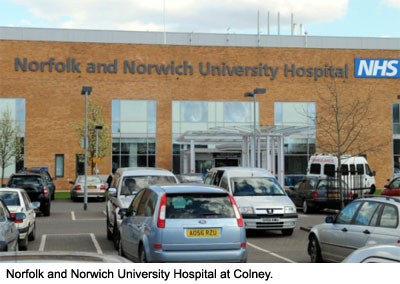 Health chiefs have pledged to improve services at Norfolk’s biggest hospital after it emerged that the NHS trust was not hitting any of its stroke targets.
Health chiefs have pledged to improve services at Norfolk’s biggest hospital after it emerged that the NHS trust was not hitting any of its stroke targets.
Bosses at the Norfolk and Norwich University Hospital (NNUH) have drawn up a recovery plan to improve the speed of treatment and standard of care for patients who have suffered a stroke.
The hospital at Colney, which is one of three stroke centres in Norfolk and treats around 1,200 stroke patients a year, is currently failing to hit six key targets.
However, officials hope to have a stroke improvement plan in place by February, which includes an increase in the number of dedicated stroke beds and additional nurses, physiotherapists and consultants.
The pledge has been welcomed by members of the Norwich Clinical Commissioning Group. However, a question mark has been raised about how the improvements will be funded.
Patients who have suffered a stroke are supposed to be admitted to a hyper-acute stroke unit (HASU) within four hours of arrival at hospital. However, only 59pc of patients were admitted to HASU in that time limit so far this year.
The hospital is also failing to hit a target of ensuring patients have access to a brain scan within 60 minutes of arriving. Currently, only 76pc of patients who suffer a transient ischaemic attack (TIA) or mini stroke are treated within 24 hours, compared with the national target of 90pc.
The NHS foundation trust hopes to secure funding from the Commissioning for Quality and Innovation (CQUIN) to help make the changes.
Chris Cobb, director of medicine and emergency services at the NNUH, said the hospital provided the largest stroke service in the East of England.
“There has been significant growth in the volume of stroke patients being brought to the Norfolk and Norwich University Hospital, and as a consequence a step change is needed in the infrastructure and care pathway to support this number of patients.”
“We are working with commissioners to review and remodel the stroke pathway and our teams are meeting over the next few weeks, sharing ideas with other major stroke services and drawing on best practice to scope a system-wide plan to enable us to improve services for our patients. As part of this plan we will be expanding the number of beds allocated for stroke patients to support the growth of the service,” he said.
Jonathon Fagge, chief executive of the Norwich Clinical Commissioning Group, said he met with Anna Dugdale, chief executive of the NNUH, last week to talk about stroke services.
“We agree that stroke services for Norfolk must improve; we’re not yet in the same place about money – whether 24/7 specialist stroke care can be delivered at tariff, or whether it needs additional funding.”
“In the meantime, we will find trusts with a similarly large stroke service and arrange some joint visits for our clinicians to identify good practice in service management and bring it back to Norfolk.”
“Stroke is rising to the top of our agenda with the trust partly because there has been such significant improvement in so many areas,” he said.
Source: edp24.co.uk








